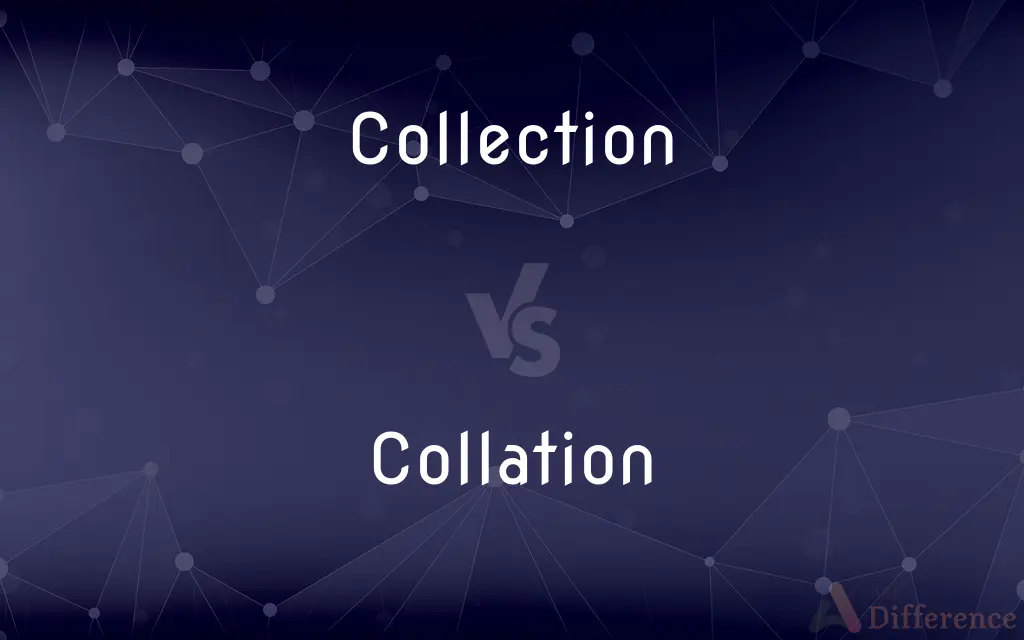Collection vs. Collation — What's the Difference?
Edited by Tayyaba Rehman — By Fiza Rafique — Updated on March 18, 2024
A collection is an assembly of items or data gathered for a specific purpose or value, while collation refers to the process of gathering, arranging, or sequencing items, often for comparison, verification, or assembly.

Difference Between Collection and Collation
Table of Contents
ADVERTISEMENT
Key Differences
Collections are often curated based on a theme, such as art collections or stamp collections, signifying the grouping of items that share a common attribute or interest. Collation, on the other hand, involves the orderly arrangement of different items, such as pages in a book or data in a database, ensuring they are in the correct order or format.
While the act of collecting emphasizes the acquisition and possession of items, collation focuses on the organizational aspect, ensuring that items are correctly ordered, aligned, or matched. Collation can be part of managing a collection, especially when it comes to cataloging or arranging items systematically.
Collections can be tangible, like books in a library, or intangible, like a digital music library. Collation, however, is a process that can be applied to both physical and digital realms, such as collating pages during bookbinding or sorting database entries.
In the context of databases or information systems, a collection might refer to a grouping of data sets or records, whereas collation could involve the comparison and alignment of these data sets according to specific criteria, such as alphabetical or numerical order.
Comparison Chart
Definition
An assembly of items or data gathered around a specific theme or for their value.
The process of arranging, assembling, or sequencing items or data for comparison or organization.
ADVERTISEMENT
Purpose
To gather items of interest, value, or theme for enjoyment, study, or preservation.
To ensure items are in the correct order, aligned, or matched for coherence and consistency.
Focus
Acquisition and possession of items.
Organizational aspect of items, ensuring proper order or format.
Application
Can be tangible (e.g., art collections) or intangible (e.g., digital collections).
Applies to both physical (e.g., bookbinding) and digital realms (e.g., database sorting).
Contextual Use
Libraries, museums, personal hobbies.
Publishing, data management, information systems.
Compare with Definitions
Collection
A grouping of items, often themed or valuable.
Her stamp collection includes rare finds from around the world.
Collation
Ensures items are in the correct sequence or match.
The collation of manuscript pages was essential before binding.
Collection
Can be for personal enjoyment, study, or investment.
His art collection has grown into a significant investment.
Collation
Can involve comparison for verification or assembly.
Collation of the contract versions revealed significant discrepancies.
Collection
Reflects the collector's interests or expertise.
The scientist's collection of specimens was crucial for her research.
Collation
Is crucial in data management for accuracy and coherence.
Database collation helped streamline the retrieval process.
Collection
Can grow and evolve over time.
The library's collection of books expands with each donated item.
Collation
Often precedes the final assembly or presentation.
The documents required collation before the meeting.
Collection
Involves the act of searching and acquiring new items.
Adding to his vintage record collection is his favorite hobby.
Collation
Applies to physical and digital contexts.
Digital collation of photographs facilitated the archival process.
Collection
The activity of collecting.
Collection of trash will occur every Thursday.
Collation
Collation is the assembly of written information into a standard order. Many systems of collation are based on numerical order or alphabetical order, or extensions and combinations thereof.
Collection
The action or process of collecting someone or something
She left the envelope in the office for collection
Refuse collection
The collection of data
Collation
The action of collating something
Data management and collation
Collection
A group of things or people
A rambling collection of houses
Collation
A light informal meal
A cold collation
Lunch was a collation of salami, olives, and rye bread
Collection
College examinations held at the beginning or end of a term, especially at Oxford University.
Collation
The act or process of collating.
Collection
The act or process of collecting.
Collation
A light meal permitted on fast days.
Collection
A group of objects or works to be seen, studied, or kept together.
Collation
A light meal.
Collection
A line of products produced for one season, as those developed by a designer
Promoted the summer collection in the store window.
Collation
Bringing together.
Collection
An accumulation; a deposit
A collection of dust on the piano.
Collation
The act of bringing things together and comparing them; comparison.
Collection
A collecting of money, as in church.
Collation
The act of collating pages or sheets of a book, or from printing etc.
Collection
The sum so collected.
Collation
A collection, a gathering.
Collection
A set of items or amount of material procured or gathered together.
The attic contains a remarkable collection of antiques, oddities, and random junk.
The asteroid belt consists of a collection of dust, rubble, and minor planets.
Collation
Discussion, light meal.
Collection
Multiple related objects associated as a group.
He has a superb coin collection.
Collation
(obsolete) A conference or consultation.
Collection
A set of sets; used because such a thing is in general too large to comply with the formal definition of a set.
Collation
(in the plural) The Collationes Patrum in Scetica Eremo Commorantium by John Cassian, an important ecclesiastical work. (Now usually with capital initial.)
Collection
A gathering of money for charitable or other purposes, as by passing a contribution box for donations.
Collation
A reading held from the work mentioned above, as a regular service in Benedictine monasteries.
Collection
(law) Debt collection.
Collation
The light meal taken by monks after the reading service mentioned above.
Collection
(obsolete) The act of inferring or concluding from premises or observed facts; also, that which is inferred.
Collation
Any light meal or snack.
Collection
(UK) The jurisdiction of a collector of excise.
Collation
(ecclesiastical) The presentation of a clergyman to a benefice by a bishop, who has it in his own gift.
Collection
A set of college exams generally taken at the start of the term.
Collation
The blending together of property so as to achieve equal division, mainly in the case of inheritance.
Collection
The quality of being collected; calm composure.
Collation
An heir's right to combine the whole heritable and movable estates of the deceased into one mass, sharing it equally with others who are of the same degree of kindred.
Collection
The act or process of collecting or of gathering; as, the collection of specimens.
Collation
(obsolete) The act of conferring or bestowing.
Collection
That which is collected
Collation
(ecclesiastical) Presentation to a benefice.
Collection
The act of inferring or concluding from premises or observed facts; also, that which is inferred.
We may safely say thus, that wrong collections have been hitherto made out of those words by modern divines.
Collation
(databases) The specification of how character data should be treated stored and sorted.
Collection
The jurisdiction of a collector of excise.
Collation
(obsolete) To partake of a collation, or light meal.
Collection
Several things grouped together or considered as a whole
Collation
The act of collating or comparing; a comparison of one copy er thing (as of a book, or manuscript) with another of a like kind; comparison, in general.
Collection
A publication containing a variety of works
Collation
The gathering and examination of sheets preparatory to binding.
Collection
Request for a sum of money;
An appeal to raise money for starving children
Collation
The act of conferring or bestowing.
Not by the collation of the king . . . but by the people.
Collection
The act of gathering something together
Collation
A conference.
Collation
The presentation of a clergyman to a benefice by a bishop, who has it in his own gift.
Collation
The act of comparing the copy of any paper with its original to ascertain its conformity.
Collation
The right which an heir has of throwing the whole heritable and movable estates of the deceased into one mass, and sharing it equally with others who are of the same degree of kindred.
Collation
A collection of the Lives of the Fathers or other devout work read daily in monasteries.
Collation
A light repast or luncheon; as, a cold collation; - first applied to the refreshment on fast days that accompanied the reading of the collation in monasteries.
A collation of wine and sweetmeats.
Collation
To partake of a collation.
May 20, 1658, I . . . collationed in Spring Garden.
Collation
A light informal meal
Collation
Assembling in proper numerical or logical sequence
Collation
Careful examination and comparison to note points of disagreement
Common Curiosities
What does collation involve?
Collation involves the process of arranging, assembling, or sequencing items or data, often for the purpose of comparison, verification, organization, or assembly.
Why is collation important in publishing?
Collation is crucial in publishing to ensure that pages or sections of a publication are in the correct order before the final binding or release.
How does a collection differ from collation in terms of focus?
A collection focuses on the acquisition and possession of items based on common attributes, while collation focuses on the organizational aspect, ensuring items are in the correct order or format.
Can collation be applied to digital data?
Yes, collation can be applied to both physical items, like books or documents, and digital data, like files or database entries.
What is an example of a collection in a library?
An example of a collection in a library could be a special archive of historical manuscripts related to a specific geographic region or period.
What is a collection?
A collection is an assembly of items, data, or records grouped based on a specific theme, interest, value, or purpose.
Can a collection require collation?
Yes, managing a collection, especially a large or complex one, can involve collation to catalog, arrange, or maintain the items systematically.
How does collation affect data management?
In data management, collation affects how data is organized, stored, and retrieved, ensuring consistency, accuracy, and efficiency in data operations.
Can collation involve matching items?
Yes, collation can involve matching items, such as ensuring that parts of a set are complete or that documents are correctly paired.
What role does collation play in bookbinding?
In bookbinding, collation ensures that the pages or sections of a book are assembled in the correct order before binding.
Is there software for digital collation?
Yes, there are software tools and applications designed for digital collation, which help in organizing, comparing, and aligning digital content.
Is collation only related to physical objects?
Collation is not limited to physical objects; it also applies to digital content, where it involves sorting, ordering, or aligning digital data.
How might a museum use collections and collation?
A museum might use collections to group artifacts by theme or origin and use collation to organize and catalog these items for display or study.
Can a personal hobby involve both collections and collation?
Absolutely, a personal hobby, like collecting vintage postcards, can involve both collections (acquiring the postcards) and collation (organizing them by theme, date, or origin).
Why is collation important in databases?
Collation in databases is important for sorting and comparing data, influencing how data is ordered and how text-based data is compared for queries and indexing.
Share Your Discovery

Previous Comparison
Vigour vs. Vitality
Next Comparison
Exponent vs. PowerAuthor Spotlight
Written by
Fiza RafiqueFiza Rafique is a skilled content writer at AskDifference.com, where she meticulously refines and enhances written pieces. Drawing from her vast editorial expertise, Fiza ensures clarity, accuracy, and precision in every article. Passionate about language, she continually seeks to elevate the quality of content for readers worldwide.
Edited by
Tayyaba RehmanTayyaba Rehman is a distinguished writer, currently serving as a primary contributor to askdifference.com. As a researcher in semantics and etymology, Tayyaba's passion for the complexity of languages and their distinctions has found a perfect home on the platform. Tayyaba delves into the intricacies of language, distinguishing between commonly confused words and phrases, thereby providing clarity for readers worldwide.
















































